Organ meat, and especially liver, is one of the most nutrient-dense foods on the planet. But few of us consume enough of this nutrient powerhouse on a daily basis because of its image, its taste, or its lack of availability. That’s where beef liver supplements come in: they provide nearly identical health benefits to fresh liver in a much more convenient format.
In this article, I’ll list the best beef liver supplements from grass-fed and pasture-raised cows, and provide a brief overview of the benefits of supplementing with desiccated beef liver capsules.
The table below is a quick summary of the five beef liver supplement brands I recommend, based on my research, hands-on experience and personal preferences.
| MK Supplements | Heart & Soil | Ancestral Supplements | Enviromedica | Vital Proteins | |
|---|---|---|---|---|---|
| Serving size: | 3 g | 3 g | 3 g | 3 g | 3 g |
| Servings: | 30 | 30 | 30 | 30 | 30 |
| Sourced from: | United States | United States | New Zealand and Australia | New Zealand | Unknown |
| Freeze-dried: | Yes | Yes | Yes | Yes | Yes |
| Non-defatted: | Yes | Yes | Yes | Yes | Yes |
| 100% pasture-raised: | Yes | Yes | Yes | Yes | Yes |
| Container: | Microplastic free glass bottles | Microplastic free glass bottles | Plastic | Plastic | Plastic |
| Family-operated: | Yes | No | No | No | No |
| Free domestic shipping: | For orders of $100 and above | For orders of $100 and above | With subscription only | No | With subscription only |
| Third-party lab tested? | Five step testing protocol (see here) | Yes | No testing mentioned on shop page | Yes | No testing mentioned on shop page |
| Cost per serving: | $1.26 | $1.57 | $1.26 | $0.99 | $1.26 |
← Swipe to see all columns →
My beef liver supplement brand picks for 2026.
You can scroll down to learn more about each of the brands and see the available discount codes.
Beef Liver Health Benefits
Jam-packed with valuable micronutrients like preformed Vitamin A, Vitamin B12 and iron (as well as many others), beef liver is nature’s ultimate multivitamin. Its diverse micronutrient profile provides the building blocks for a wide range of bodily functions, supporting the metabolism, immune system, skin, eyes, reproductive organs, mental health and more.
Plus, its synergistic combination of vitamins and minerals can naturally boost energy levels by supporting mitochondria (the part of every cell responsible for energy production).
Many people supplement with grass-fed liver to improve or support the following areas of their health:
- Eye health: The Vitamin A (retinol) and B vitamins in liver play a crucial role in vision, helping to maintain a clear cornea (which is the outside covering of your eye).
- Energy and mood: Liver is an excellent source of Vitamin B12, copper, heme-iron, coenzyme Q10 (CoQ10) and niacin, all of which are crucial for energy, optimal exercise performance, metabolism, red blood cell production and mood.
- Immune system: Selenium is a cofactor for the body’s antioxidant defense (glutathione peroxidase, thioredoxin reductase) and (together with copper) supports optimal immune function.
- Skin health: The hyaluronic acid, copper, zinc and selenium in liver are crucial for maintaining healthy skin and connective tissue.
- Brain health and cognition: The highly absorbable B vitamins (riboflavin, folate and B12), amino acids (anserine, carnosine, taurine and l-carnitine), choline and zinc in liver are vital for brain health and cognition, as well as for neurotransmitter formation.
- Teeth and bones: The Vitamin K2 in liver is crucial for bone and tooth health because it supports the remineralization and absorption of calcium.
If you’d like to take a deep dive into the health benefits of consuming fresh or freeze-dried beef liver and its nutritional composition, check out this article. You can also learn about other types of beef organ meat supplements available on the market, which combine multiple organs in a single capsule in order to target specific health situations and outcomes.
What to Look For
It’s important to keep in mind that supplements are largely unregulated in the United States. As a result, manufacturers have a lot of wiggle room regarding what information they put on the label and how accurately that information reflects the actual ingredients. That’s why I recommend sticking to brands you trust.
Here are the most important criteria that I recommend you look for when shopping for organ supplements.
100% Grass-Fed and Pasture-Raised
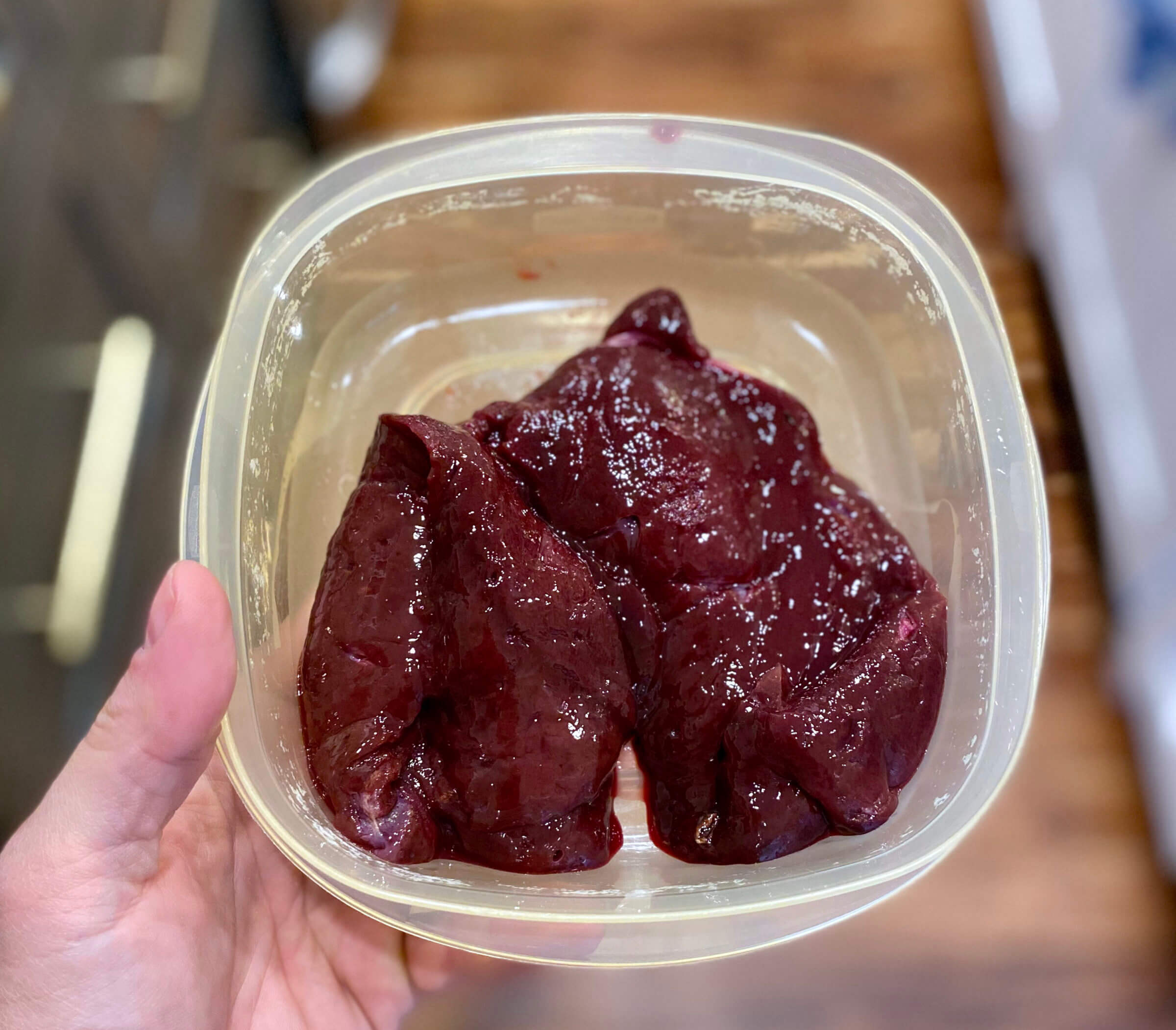
Much like when buying fresh meat, make sure the organs that were used to make a supplement were sourced from 100% grass-fed and pasture-raised animals.
That’s not only important from an ethical perspective (it ensures sustainable farming practices), but also from a quality perspective, as it leads to a supplement with a better nutrient profile.
For example, the liver (and muscle meat) of grass-fed beef has a more favorable fatty-acid composition than that of grain-fed beef.
Additionally, you can find significantly more Vitamin A (both provitamin A and preformed A) in the liver and muscle tissue of pasture-raised cows compared to grain-fed cows (as shown in this study). Those are only two of many examples that prove the superiority of pasture-raised vs. grain-fed meats.
Potency
Whatever product you choose, make sure it has sufficient amounts of liver (and thus, micronutrients). I recommend products with 3,000 or more milligrams of beef liver per serving.
Processing Method
Many vitamins and minerals are heat-sensitive and/or quickly deteriorate when exposed to air. That’s why the processing method of a whole-food supplement is crucial.
Freeze-drying is an excellent method to preserve as many micronutrients as possible, so I recommend choosing products that were manufactured using this method.
Third-Party Testing
I prefer products that have been tested to ensure ingredient quality and certain manufacturing standards. So look for ISO or GMP certifications, or ask for a test report if in doubt.
Other Ingredients
I recommend avoiding products that contain unwanted ingredients like fillers, flow agents, artificial colors and sweeteners, sugars, soy, wheat, gluten, dairy and anything else you don’t recognize.
Cost Per Serving
Instead of solely looking at the price per bottle and the number of capsules per bottle, make sure you understand what the price per 3,000 mg serving is.
Brands use different capsule sizes, which determines whether one serving is comprised of four, five or six capsules.
In other words, 180 capsules may yield either 30 or 45 servings per bottle, depending on the capsule size.
Eco-Friendliness
Regardless of what your stance is as far as climate change is concerned, I think we can all agree that humans produce too much plastic waste. As a result, I encourage you to look for brands that actively try to reduce plastic waste by using glass containers, metal lids and paper-based packaging materials.
Microplastics
It’s virtually impossible to completely avoid microplastics in modern society, but it’s crucial to try to reduce your exposure whenever possible. That’s why I prefer brands that use glass bottles instead of plastic — because it reduces the likelihood of microplastic contamination of the contents.
My Picks For the Best Beef Liver Supplement Brands
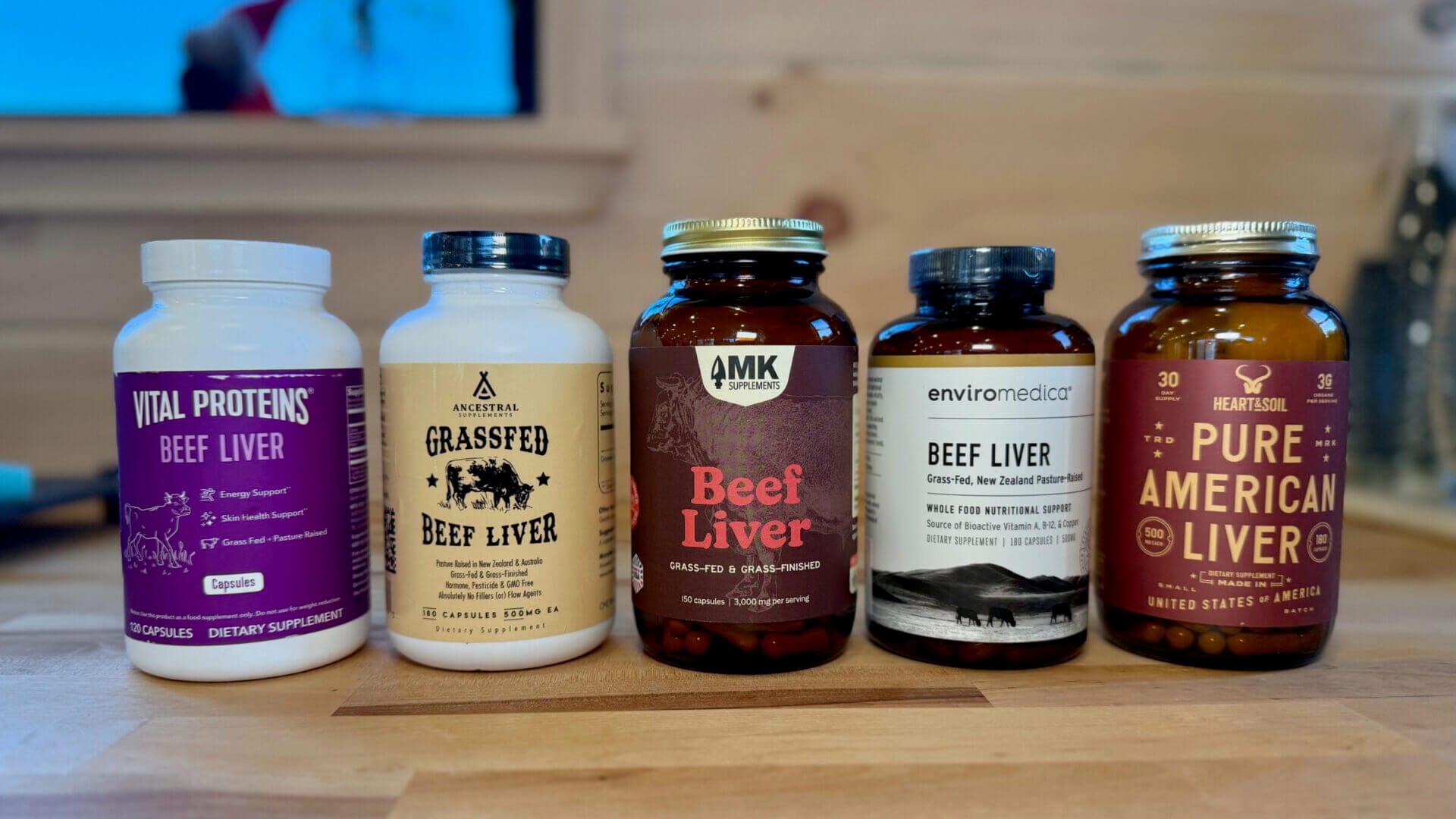
Below is a list of five supplements we’ve used in the Kummer household. While there might be other brands that offer similar ingredient quality, these are the ones I have tested and thus recommend.
MK Supplements Beef Liver
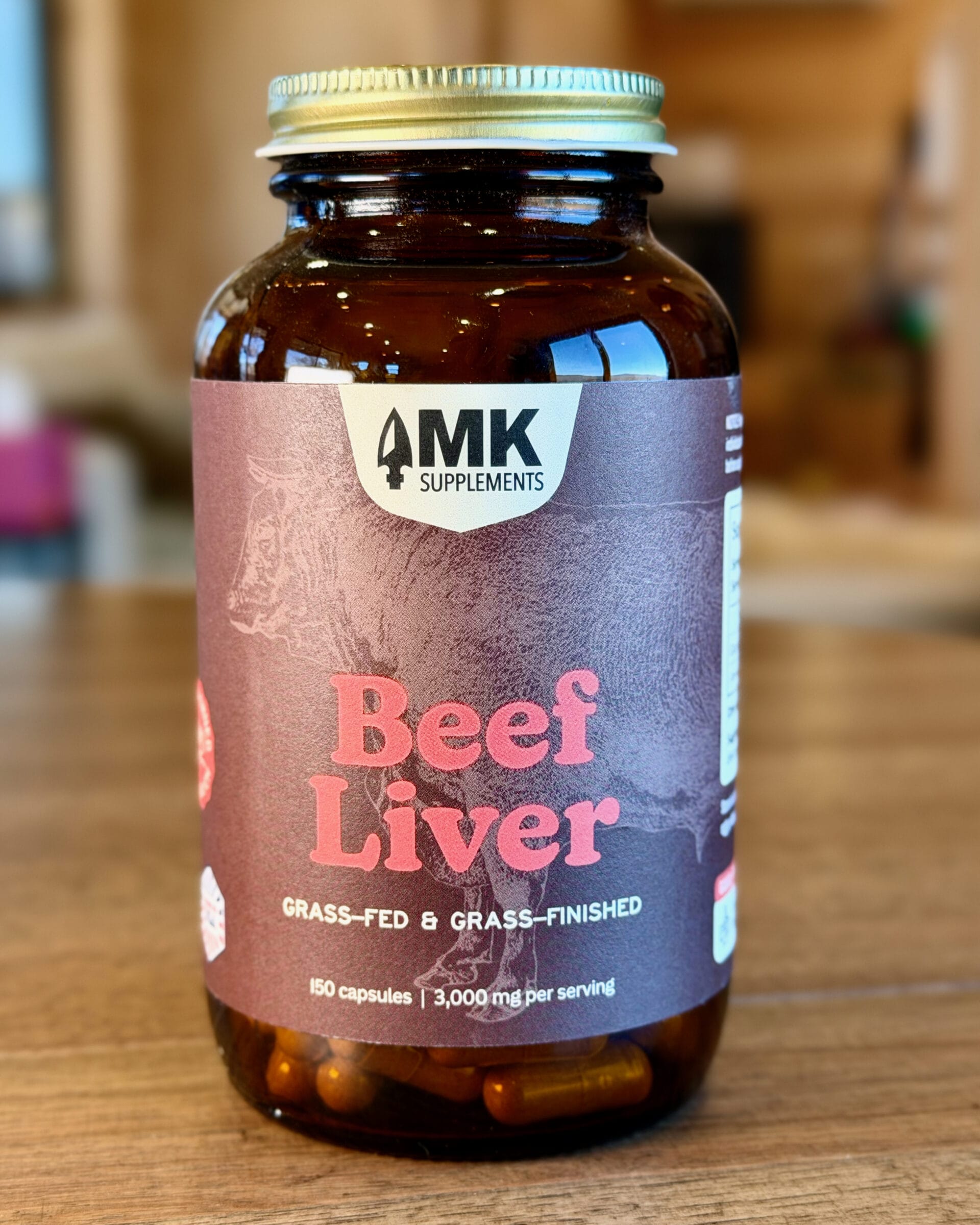
When I first wrote and published this roundup in 2020, I had no intention of launching my own line of beef organ supplements. I had tried and/or researched all of the supplements highlighted in this article, and I still have no hesitation about recommending them. They’re all high-quality products that can help you optimize your diet.
But as I analyzed the specific details of the different options available in the marketplace, I started to realize they all fell short of my ideal standard in one area or another — whether that meant using extended periods of very high heat during production (which damages some of the livers’ nutrients) or being shipped in plastic bottles (which contain xenoestrogens that studies have shown can leach into the contents).
I’m not the kind of person who likes making compromises when it comes to my health. So I decided to develop a supplement that better aligns with my lifestyle and meets my admittedly high standards.
Months of research and development led to what I sincerely believe is the best beef liver supplement on the market.
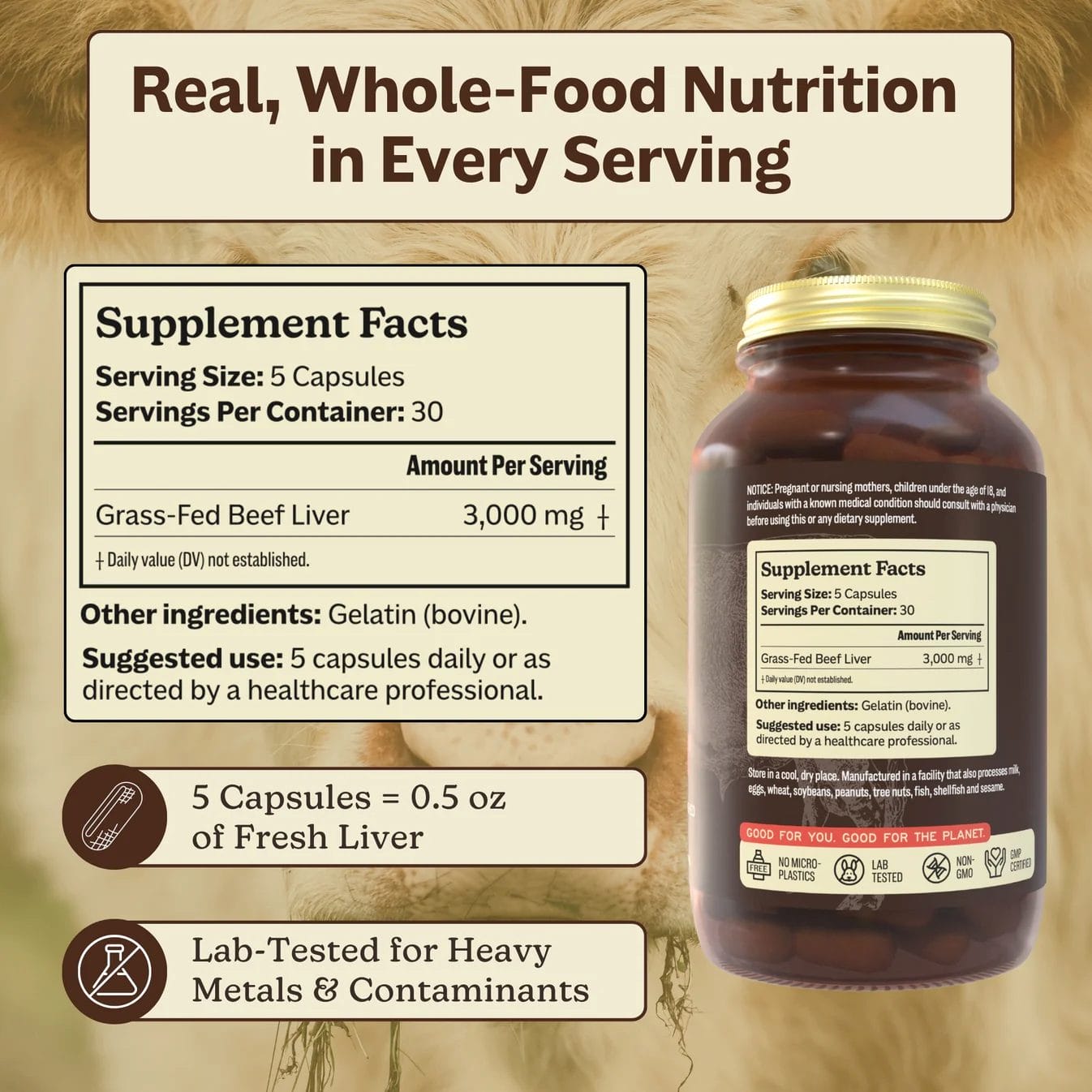
All our beef liver supplements come from pasture-raised and 100% grass-fed and finished cattle raised in the United States.
When my wife and I first launched MK Supplements, we sourced all our raw materials from New Zealand, where some of the highest-quality beef and organ meat is produced. But over the years, we realized that it doesn’t make much sense to fly ingredients halfway across the world when we could support local ranchers instead.
That’s why we now source most of our ingredients from local farmers who support regenerative farming practices and who care about animal welfare and soil quality.
As you should expect from a premium organ meat supplement, we manufacture in GMP-certified and FDA-inspected facilities and test each lot five times for contaminants such as mold, yeast and heavy metals before it reaches your pantry. You can always find the latest test reports directly on our product page (just look for the “Tested by Light Labs” widget).
None of our supplements contain fillers, flow agents, additives, antibiotics, GMOs, hormones or other substances you wouldn’t want in your body, and as I said above, we use plastic-free packaging to avoid contaminating our real-food ingredients with microplastics and endocrine-disrupting chemicals.
To make our Beef Liver supplement available to as many customers as possible, we also offer free shipping on all domestic orders over $100 and a full 60-day money-back satisfaction guarantee. If you’d like to try our Beef Liver supplement, use code BLOGLOVE10 for a 10% discount off the regular price.
You can also find MK Supplements on Amazon!
Heart & Soil Pure American Liver
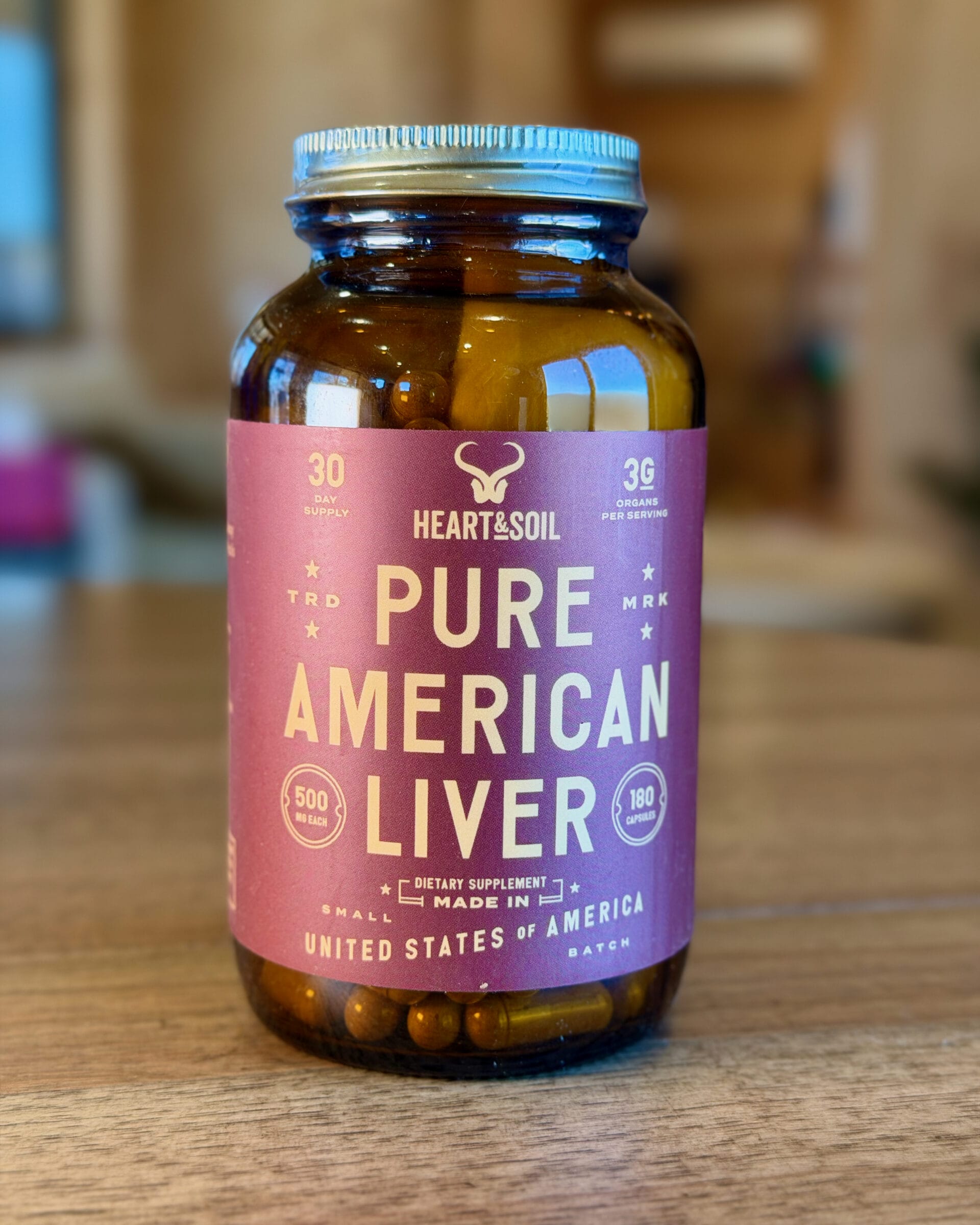
Co-founded by Dr. Paul Saladino and Brian Johnson (aka the Liver King), Heart & Soil is one of the top players in the organ meat supplement industry.
Unsurprisingly considering their shared roots, Heart & Soil sources most of its ingredients from Australia and New Zealand and, for many years, the company offered only organ mixes but no standalone liver supplement.
With the introduction of Pure American Liver, that changed. It’s Heart & Soil’s first supplement made in the USA. And much like their imported ingredients, their beef liver comes from 100% grass-fed, grass-finished and regeneratively-raised cattle.
Plus, the product has been tested for heavy metals and other contaminants using a third-party lab.
Overall, Pure American Liver is an excellent supplement with nothing to complain about as far as the ingredients are concerned. However, at $47 it’s relatively expensive. In fact, it’s $9 more than MK Supplements Beef Liver, without offering any benefits compared to our brand.
At the same time, if you like Paul Saladino and his brand (like I do) and already purchase their other supplements, Pure American Liver can be an excellent addition to your organ meat supplements regimen.
Buy Heart & Soil Pure American Liver
Ancestral Supplements Grass-Fed Beef Liver
Ancestral Supplements’ nose-to-tail product line is always derived from grass-fed animals that were raised without the use of pesticides, hormones or antibiotics.
What I like about the company is that it offers a variety of organ meats and beef “byproducts” that you often won’t find anywhere else, including heart, thyroid, pancreas, spleen, bone marrow, thymus, brain, kidney, trachea, prostate, adrenal, intestines, gallbladder, lung, colostrum, eyes and more.
In other words, the company is literally taking “nose-to-tail” eating to the next level — and I love it.
Ancestral Supplements’ beef liver is carefully processed (freeze-dried), non-defatted, and made from only the best and purest ingredients using cattle from New Zealand.
The only thing I don’t like about Ancestral Supplements is how its founder, Brian Johnson (aka the Liver King), turned out to be a liar and a scam artist. While that doesn’t change the quality of their products, it certainly leaves a bad aftertaste (pun intended).
Buy Ancestral Beef Liver on Amazon
You can also buy directly from Ancestral Supplements, but the price may be slightly higher because of shipping fees.
Enviromedica Beef Liver
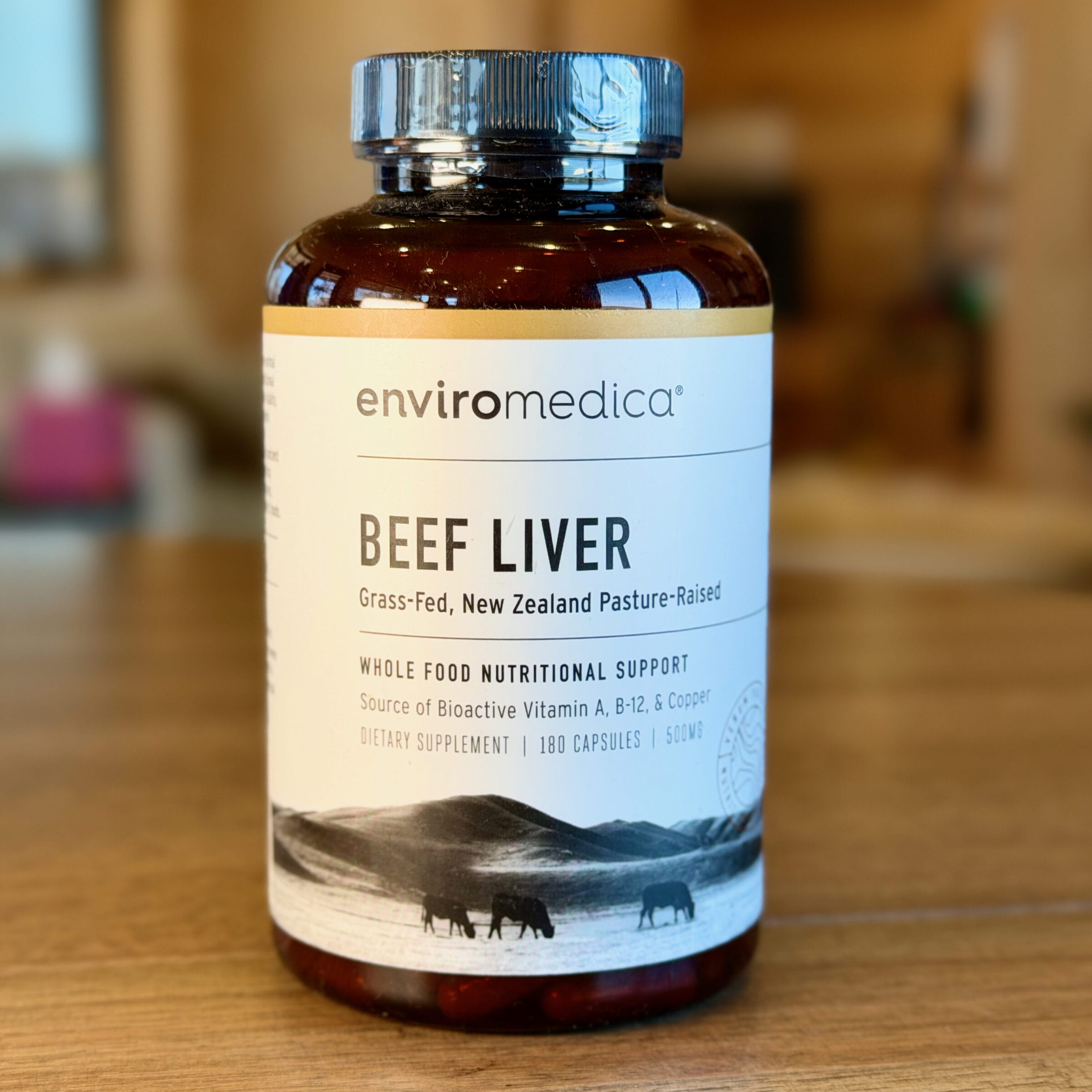
Enviromedica is at the top of my list of favorite supplement brands because of its strong focus on ingredient quality and clean manufacturing practices. Enviromedica’s facilities are GMP compliant and ISO22716 certified.
Sourced exclusively from grass-fed, pasture-raised New Zealand bovine, Enviromedica’s beef liver is an abundant source of nutrients including protein, Vitamins B6 and B12, folate, choline, copper and hyaluronic acid, and is a concentrated source of preformed Vitamin A (retinol).
Additionally, all of the company’s supplements are true-to-label. That means what’s on the label is exactly what’s inside, with no exceptions.
Aside from the trust I have in the brand and the positive experience I’ve had with some of Enviromedica’s other supplements, I like their beef liver tablets because they don’t contain anything but liver and gelatin (for the capsule).
In other words, the product is free of dairy, wheat, yeast, gluten, corn, sugar, soy, shellfish, tree nuts, stearates, fillers, flow agents or any other potentially irritating ingredients.
And at around $1.00 per serving, the supplement is also reasonably priced.
Make sure to use code HEALTHTECH to get 10% off your purchase.
You can also find Enviromedica on Amazon.
Vital Proteins Beef Liver
Vital Proteins’ Beef Liver is also an excellent choice — albeit one that’s priced on the upper end of the spectrum.
From an ingredients perspective, these beef liver pills are comparable to the products from MK Supplements, Ancestral Supplements and Enviromedica.
Give the higher price point, it’s not my top recommendation because there’s nothing about it that particularly stands out. However, it is widely available — including at retailers like Whole Foods — so it’s easy to get in a pinch.
Buy Vital Proteins Beef Liver on Amazon
You can also shop directly on Vital Proteins’ website.
How Many Nutrients Are In Beef Liver Supplements?
Beef liver is objectively nutritious. But for most people, the million-dollar question is this: how many of those nutrients are retained in freeze-dried beef liver capsules?
Three grams of freeze-dried liver — the standard dosage for liver supplements — contains approximately the same micronutrients as 14 grams (half an ounce) of fresh beef liver.
It also has approximately 2 grams of protein (compared to about 7 grams in one ounce of fresh beef liver), and negligible amounts of fat and carbs. (That’s because the freeze-drying process breaks apart most of the molecules that make up carbs and fat, while retaining 95-97% of the micronutrients.)
But here’s the thing: not all freeze-drying methods retain nutrients in the same way. Plus, as a natural, whole-food product, nutrient levels may vary between lots.
Our freeze-drying partner has conducted extensive micronutrient testing of the ingredients we use in our Beef Liver supplement, and below is an overview of the key micronutrients you can expect in one serving (three grams) based on that testing:
| Nutrient | Amount / %DV |
|---|---|
| Copper | 99% |
| Vitamin B12 (Cobalamin) | 55% |
| Vitamin A (Retinol) | 35% |
| Molybdenum | 25% |
| Vitamin B7 (Biotin) | 18% |
| Selenium | 17% |
| Vitamin B2 (Riboflavin) | 14% |
| Vitamin D3 (Cholecalciferol) | 9% |
| Vitamin B9 (5-MTHF) | 6% |
| Vitamin B5 (Pantothenate) | 6% |
| Zinc | 4% |
| Iron | 3% |
| CoQ10 | 0.05 µg |
*Percent Daily Value (%DV) based on FDA Daily Values for adults and children 4+. Nutrient values shown are derived from laboratory testing of a single production lot and should be considered guidelines.
Who Should Not Supplement With Beef Liver?
Desiccated beef liver supplements are safe for most people, including children and pregnant women. The latter can greatly benefit from the Vitamin B9 (folate) in liver, which is much better absorbed and used by the body than the synthetic version (folic acid) found in traditional multivitamins.
However, if you suffer from hemochromatosis, Wilson’s disease or severe hepatitis (liver disease), you should either avoid consuming liver or consume only small amounts, based on the recommendation of your doctor.
Potential Side Effects of Beef Liver Supplementation
Side effects of consuming freeze-dried beef liver are rare, but some of my customers have reported a temporary change in bowel movement or light constipation. You might also experience an optimized detoxing process that could make you feel more fatigued for a few days.
So if you’re new to consuming organ meats, I recommend starting with half the prescribed serving size for a few days before ramping up your intake.
Note that many of my customers take more than the prescribed number of liver capsules without any negative side effects. I usually supplement with 4,500 to 6,000 mg of desiccated beef liver and never experience any problems with Citamin A toxicity or other theoretical issues.
You can learn more about proper Vitamin A dosing — and why there’s very low risk of toxicity when using beef liver capsules — in our article on the best Vitamin A supplements.
Freeze-Dried Beef Liver for Pets
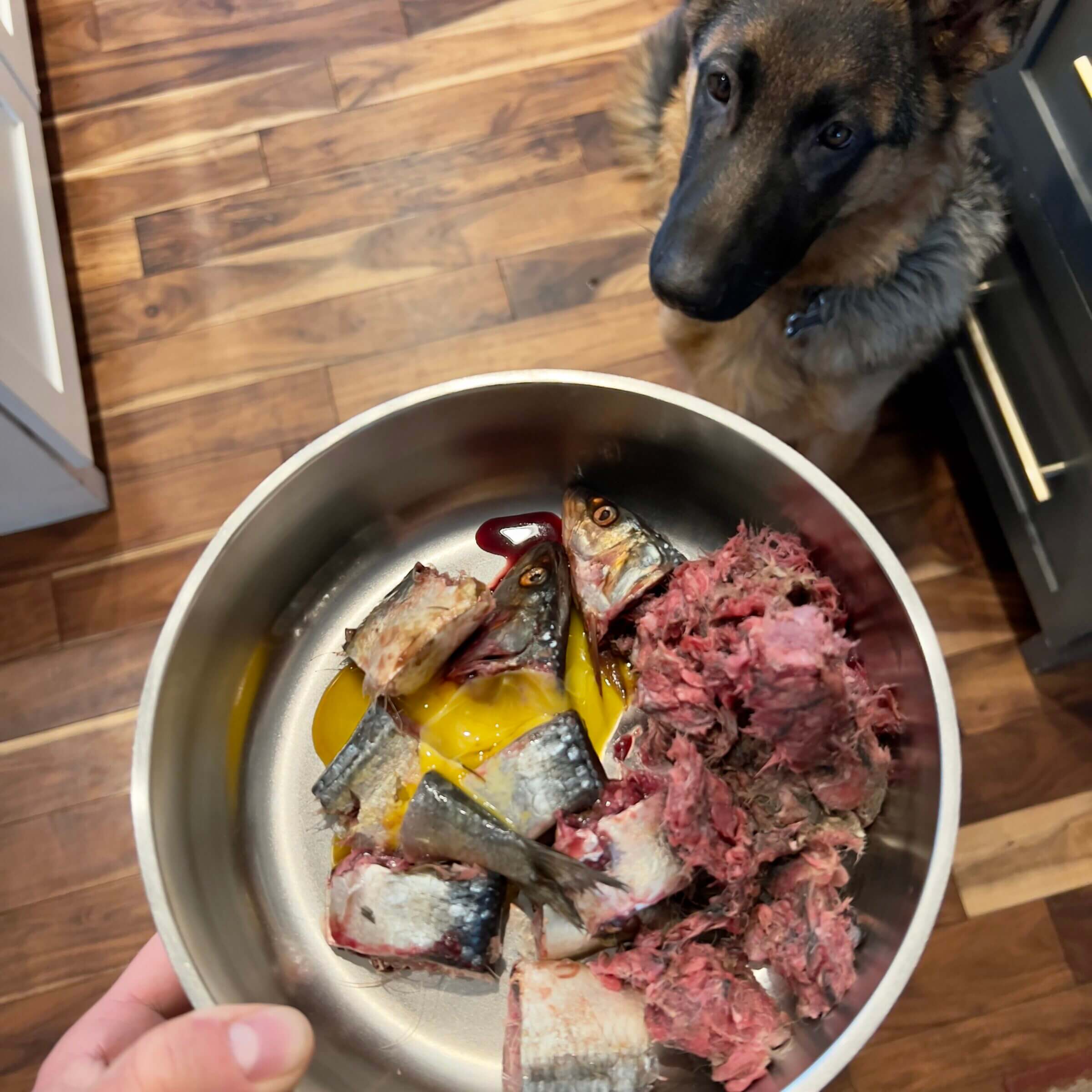
Dogs and cats are carnivores that thrive on a diet consisting of raw muscle meat, organs and bones. But if a raw food diet isn’t in the cards for you, adding freeze-dried beef liver to your furry friend’s diet is a great way to improve their health and well-being.
Depending on the size of your pet, you can either feed them the entire capsule(s) or mix the powder from the capsules with their regular food.
For reference, liver can make up approximately 5% of a dog or cat’s meals (by weight). Our German Shepherd weighs 65 pounds as of this writing and eats approximately 38 oz. of raw meat, organs and bones per day.
That means he eats 1.9 ounces of liver per day, which translates into almost 6,000 mg of freeze-dried liver.
Summary & Final Thoughts

There are many health benefits of eating organ meat, which has been an essential part of human nutrition for millions of years. Unfortunately, the combination of our modern lifestyles and the industrialization of food has removed this nutritional powerhouse from the plates of most people.
The results of our modern eating habits are a dramatic increase in metabolic disease and obesity rates, as well as widespread deficiencies of essential vitamins and minerals. So it’s time to reverse that course and to start nourishing our bodies with the foods we are genetically primed to consume.
While I highly recommend trying to get pasture-raised organ meat (including liver) back on the dinner table, I also understand that this isn’t as easy for everyone as I might make it sound.
At the Kummer household, we started including liver in our diet a few years ago. But we still don’t consume the variety and amount of organ meat that we should.
That’s why I believe including the right supplements on top of a solid dietary framework — even if that doesn’t yet include the regular consumption of organ meat — is an excellent idea.

Michael Kummer is a healthy living enthusiast and CrossFit athlete whose goal is to help people achieve optimal health by bridging the gap between ancestral living and the demands of modern society.

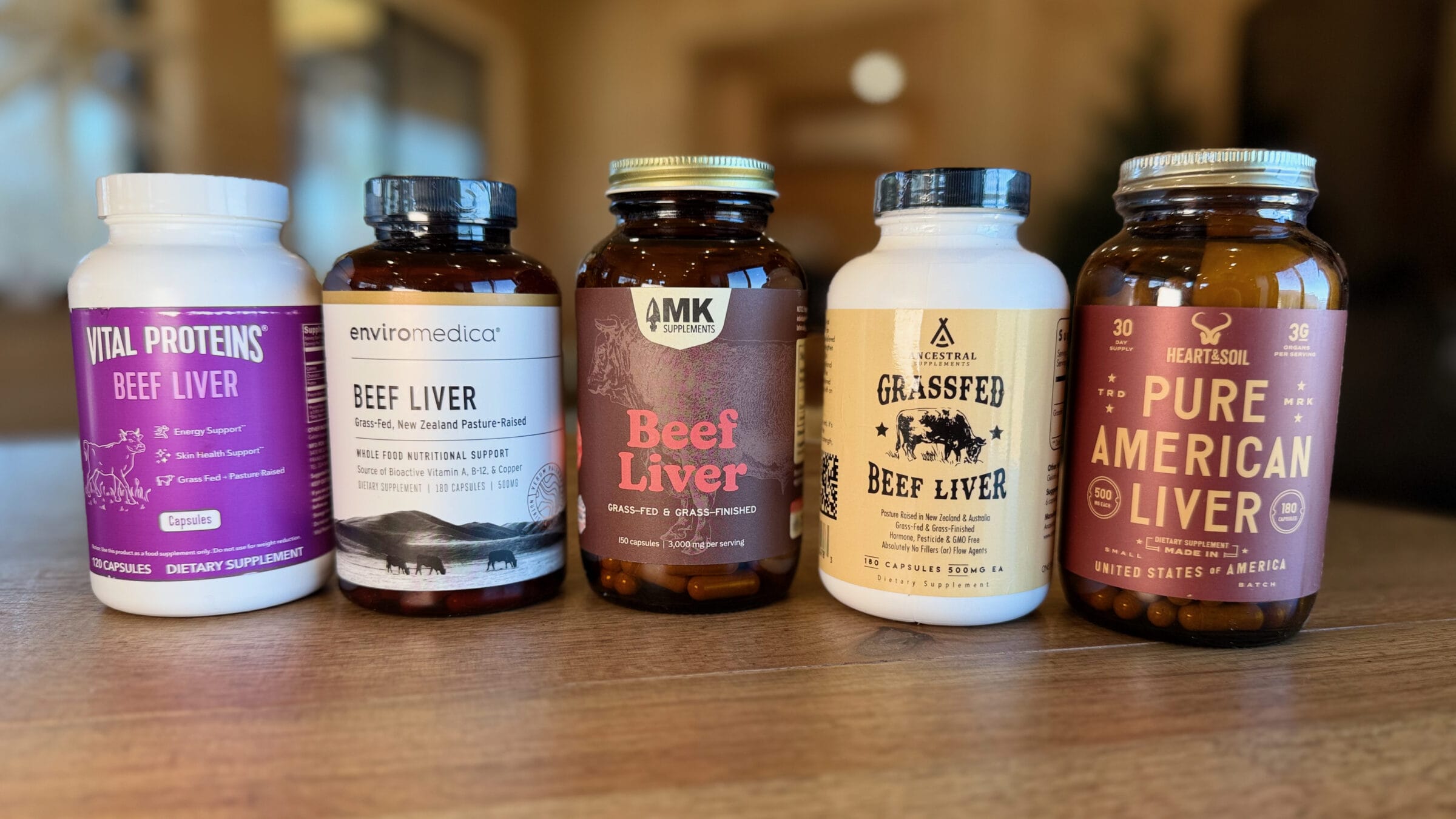
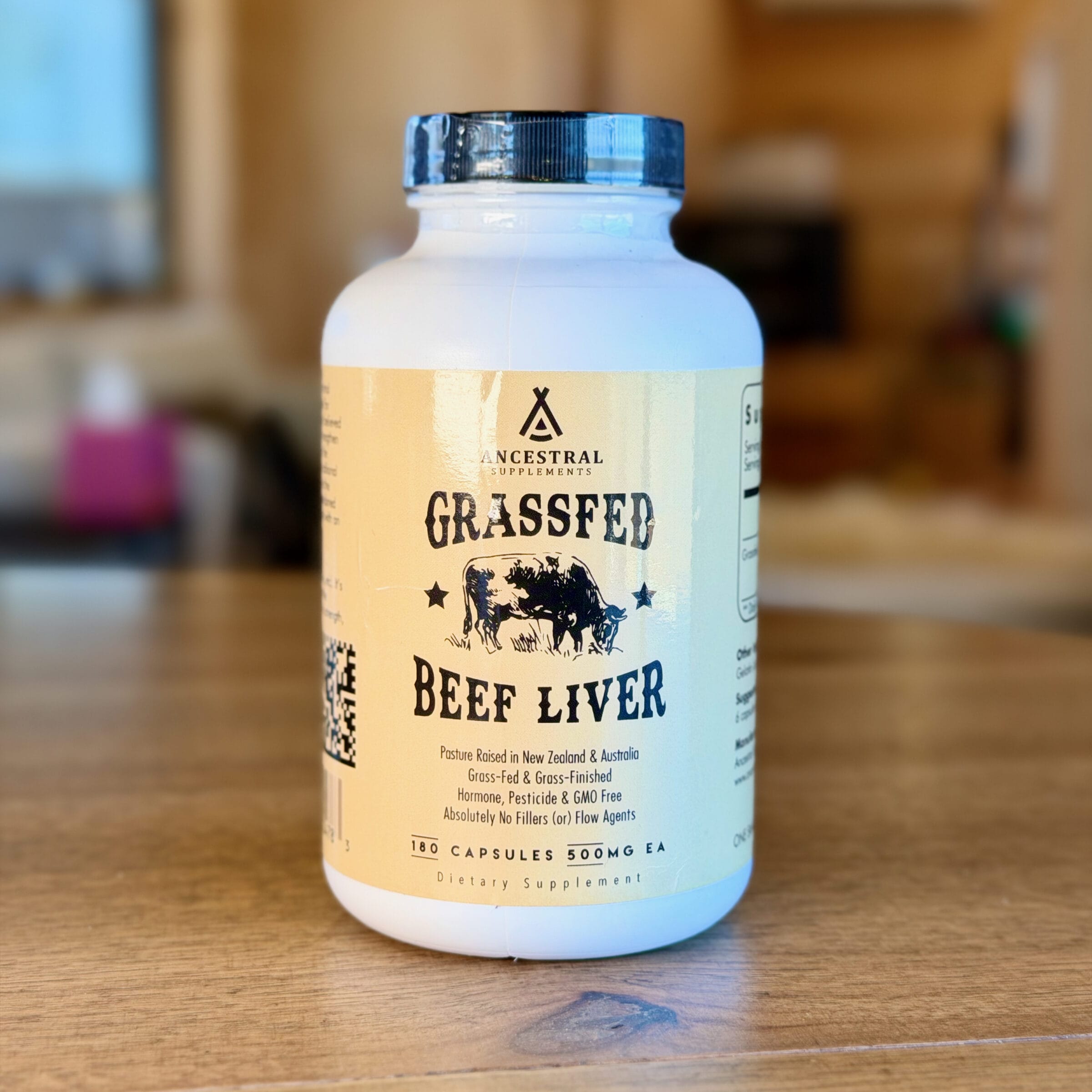
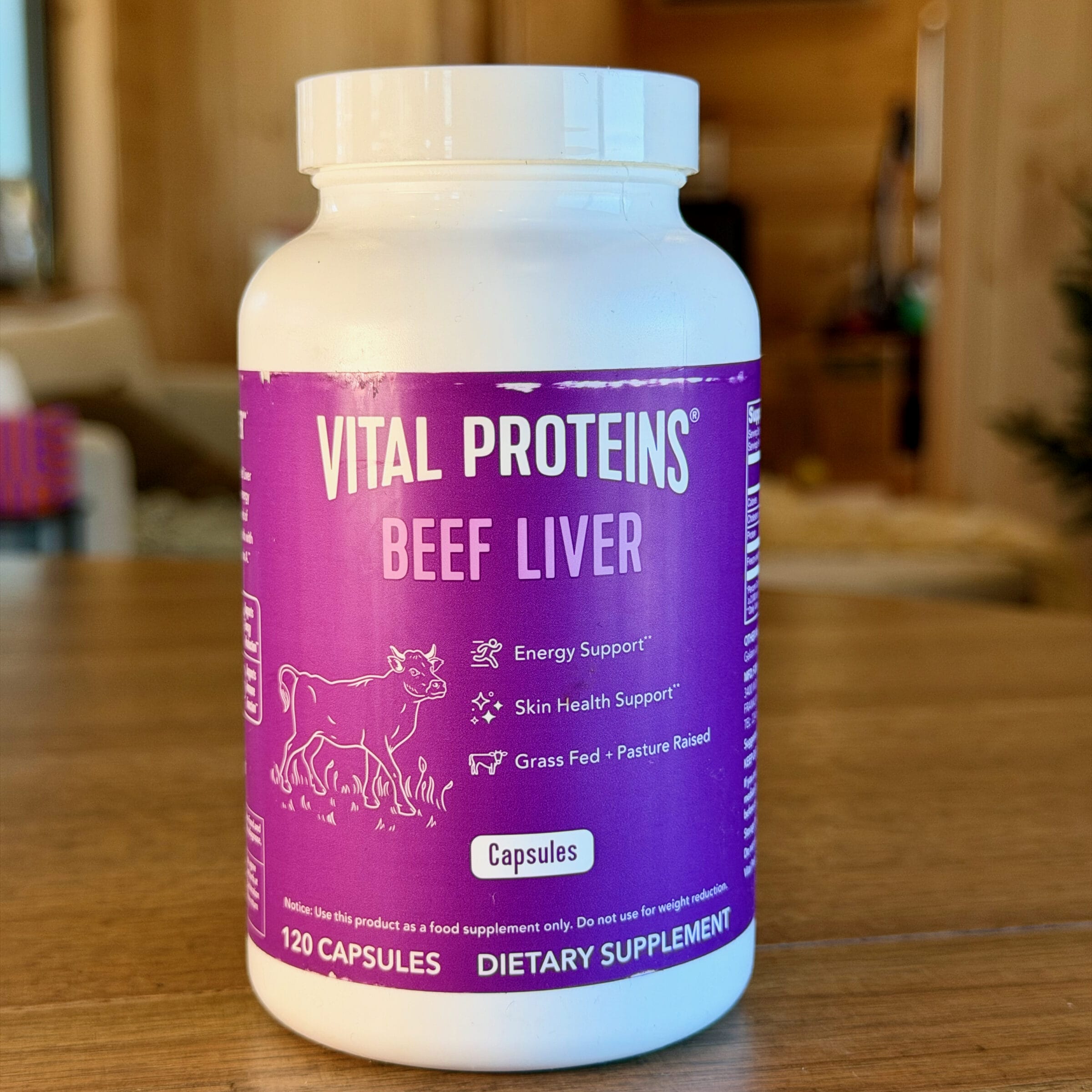

I have a very sensitive stomach and intestines. Are the capsules harmful to my condition?
Hey Pat, I don’t think they’re harmful to your condition but the only way to find out how you’ll respond is to give them a try.
Thanks for the wealth of information you provided.
I do have a question about your experience with Ancestral Supplements (since you mentioned they have taken “nose to tail” to the next level with offering more products that are “organ specific.”
You mentioned taking MOFO as well as the Thymus. You’ve also mentioned that supplement companies are businesses just like big pharma co’s.
How do you balance what you take from Ancestral Supplements? I think anyone would probably agree with me that taking every single product offered would lead to taking too much of certain nutrients/etc., one’s body’s ability to absorb the additional products could be hindered if too many capsules are consumed daily. Where do you strike your balance (personally & for your family…….this is not a medical question).
Thanks & for all you do to help those of us on the same journey and allowing use to learn from you experiences as well as other individuals out there. It is tremendously helpful to hear about someone else’s experiences & their opinions.
Hey TG,
You definitely have to take every single product they offer. Unless you have any specific requirements, I’d stick to an organ mix that will cover most of your nutritional needs. In fact, since writing the article, we have launched our own freeze-dried beef organ supplements company. You can find us at shop.michaelkummer.com.
If you have trouble swallowing pills, can you break down the capsule and take with a shake or something?
Yes, absolutely! My three-year-old niece just chews the capsules. So that’s an option too.
Do you know if desiccated liver contains taurine?
Yes, most organs have taurine, including liver!
Hi MK,
How many ounces per week of liver does the recommended number of daily capsules equate to? I’ve been having trouble finding that online. For example, if I’m taking 4 capsules/3,000mg each day – is that equivalent to roughly 3oz a week?
Hey JC,
3 grams of our freeze-dried organ meat capsules have the same micronutrients as 1 ounce of fresh organ meat. So if you consumed 7×3 (21 grams) of freeze-dried organs per week, it’d be the equivalent of 7 oz of fresh organs.
Hi Michael,
Is there saturated fat and cholesterol in the pill supplement form, just like there is in actual prepared beef liver? Or is there a substantial decrease in those elements with the pills? I currently take your beef liver supplement’s and am a big believer in the health benefits. I also cook it occasionally.
Hi CW!
Thanks for being a valued customer, I appreciate it! Freeze-dried liver has only residual amounts of fat (saturated or otherwise) and carbs as compared to fresh liver. However, neither saturated fat nor dietary cholesterol are bad for your health (it’s a long-held myth) and you can read more about that in this article: https://michaelkummer.com/saturated-fat-risks/ (assuming that was your concern).
Cheers,
Michael
Could you clarify how many mg of iron is in one serve (or 3000mg) of dried liver? I noticed you listed all the vitamins and minerals, but not iron (which is the part I’m particularly interested in) – unless I missed this somehow? Many thanks.
Hi Lauren!
The table actually shows the amount of iron in one ounce of liver as 1.4 mg — one ounce of fresh liver is the equivalent of 3 grams of freeze-dried liver.
Cheers,
Michael
hi there,
I have a freeze dryer and i am going to make my own capsules. I have went over the web looking to see if I can freeze dry raw or must be cooked. lots of mixed answers. most say there’s still risk of getting ill from either parasites or bacteria unless cooked. weston price says if frozen for two weeks then in the clear but there’s debate about that as well. what do you suggest?
thank you,
-stacy
Hi Stacy,
It’s true that consuming raw (uncooked) organs carry a risk of disease. That’s why it’s important to source your organs from farms and butchers who handle them accordingly. The same goes for handling the organs at home. Freezing meat and organs for two keeps kills some but not all pathogens. For example, salmonella can survive in the freezer.
However, if you cook the liver before freeze-drying it, you destroy some of the heat-sensitive nutrients. That’s why I have my capsules tested in a lab to ensure their safety.
That said, I regularly consume raw organs at home because I trust their source. So you’ll have to make the call whether it’s worth the hassle and risk of making capsules at home vs. buying them from companies like mine.
Cheers,
Michael
How come there is no K2, even though grassfed beef liver is touted as the densest of k2 sources?
Hi Tuuka,
there is K2 in liver but as far as I know, the daily recommended value hasn’t been established. In other words, we don’t know how much you need exactly. That’s why I said N/A in the DV % column.
Cheers,
Michael
What other Ancestral products do you take?
I got a huge shipment with all of their products and I’m working my way through them. Right now, I’m taking Thymus.
Is it good to take liver supplements for folate if I am planning pregnancy?
Thanks,
Shree
Hi Shree,
one serving of MK Supplements Grass-Fed Beef Liver has about 20% DV of folate (Vitamin B9). Depending on your diet, you might need some more and I’d recommend checking with your OBGYN how much folate (not the synthetic folic acid) you need.
Cheers,
Michael
Should you take 6 a day even if you weigh 105 lbs?
Hi Rewa,
If you’re an adult, you can take 3 grams as well (that’s 4 – 6 capsules, depending on the manufacturer). My wife weighs 110 lb and takes 4 capsules of my supplement (that’s 3 grams of liver).
Cheers,
Michael
Hello, does your wife take it daily? I’m wondering if it is safe to take it daily, for years. Thank you!
Hi Jolene,
yes, my wife takes it daily and so do our kids. Consuming organ meats (fresh or freeze-dried) on a daily basis is perfectly safe, unless you suffer from a preexisting condition that would prevent you from metabolizing some of the vitamins or minerals in liver.
Cheers,
Michael
Thanks for the article and the suggestions. I really appreciate you coming out with glass bottles instead of plastic!
You mentioned a concern in the processing of liver, that heat drying is worse than freeze-drying because the liver loses some of its nutrients but also that eating fresh liver is the best option. Wouldn’t cooking liver at home also affect its nutrients? So why would heat-drying be worse? Trying to understand the scientific difference between cooking at home, freeze-dried liver pills and heat-dried pills.
Hey Ian,
yeah, cooking liver will also degrade some of the heat-sensitive micronutrients. That’s why I fry only the outside and leave the inside as pink as possible when I make pate at home.
To get the most nutrients out of the liver, you’d have to eat it raw as I did during the last Thanksgiving dinner :)
But there is obviously a risk of food-borne pathogens by doing so. That’s why I pop one or two capsules even on days where I eat cooked liver.
Cheers,
Michael
Love the detailed article on the benefits of beef liver supplements. Also found some good technical info on the contents of beef liver that is related to workout recovery here: https://blog.hirschorganic.com/beef-liver-the-ultimate-workout-supplement/
I see a lot of claims but almost no peer reviewed scientific studies. I think there’s probably a net benefit in most cases, but how can you really be sure if you don’t have experimental data to back it up. I think it is best to consult with your doctor before taking this supplement.
Hi Sam,
what claims, in particular, would you like to see evidence for?
Cheers,
Michael
Consult a doctor? Why? So he can steer you toward big pharma products that instead of supporting and healing you at the cellular level actually just mask your symptoms, toxify your body and cause chronic illness and disease?
Wake up, bro.
Big pharma medicine is a for-profit, turn-key operation that doesn’t take your long-term well-being into account.
Hi Steve,
Supplements are also “for-profit”. Welcome to capitalism.
“Big Pharma” also includes all supplements sold anywhere. We all want the most natural and best nutrition sources, but to think that doctors are any more evil than a company selling you vitamins is paranoid.
Very true , shots also cause more damage than good . I have seen it first hand in my family.
Is there a chicken liver supplement or something? I’d like my family to start eating more liver but they don’t eat beef so I’m not sure what to do at this point.
Hi Dilpreet!
I haven’t come across beef liver supplements that are made with something other than beef. But you could try my liver pate recipe and use the liver from chicken, turkey or other animals? See https://michaelkummer.com/recipes/liver-pate/
Thanks for the informative article! We have been buying Ancestral Supplements and I’m pleased to see it on your list. I noticed you say you take 1 capsule (of one of the above products) per day. Ancestral’s dose is 6. I’m a smaller woman, so I decided I’d take less because I’d eat a smaller serving if I were eating it on my plate AND I dont take it every day, because I wouldn’t eat liver every day. My question is, based on your research, does that make sense to you? Does it make sense to take the supplements a few times per week rather than every day? And maybe a smaller quantity if you aren’t a 180# male? Thanks
Hi Anne,
where in the article do I say to take only 1 capsule a day? I couldn’t find it but if I say so, it’s a typo :)
I eat an ounce or so of liver (fresh or freeze-dried) almost every day but also try to mix it up with other organ meats (from Ancestral Supplements). I’d try to eat small amounts of liver several times (3-4x) a week and then mix in other organs.
Cheers,
Michael
Great info. Since e coli can survive freezing temps, do you know if it is possible for e coli to survive in the freeze dried liver powder supplements?
Hi Ann,
Yes, that’s possible but highly unlikely. Plus, the livers are usually tested for common pathogens before being processed. So I don’t think you should be concerned about an E.coli contamination in liver supplements.
Cheers,
Michael
Hello, and thank you for your article. I have some questions ….mostly about the amount of fresh liver and nutrients per serving of the 6 liver capsules. If the liver loses average of two thirds of its weight during the drying process……6 capsules equaling 3 grams of dry weight….would mean that each serving would be equivalent to 15 grams of fresh weight. My question is …How does this equate to the nutrients being equal to 1 ounce of fresh liver….ie 1 ounce is 28.3495 grams. I have reached out to Ancestral Supplements about this….great company, Brian very approachable and willing to answer questions. But he told me the same thing……one serving ..(6 capsules, weight 3grams is equal to the nutrients in 1 ounce of fresh liver……they measure by nutrient content)…..this makes no sense to me. 15 grams of freah liver cannot contain the same amount of nutrients as 28 grams.
I have actually dried some liver and weighed it before and after and it does actually lose roughly two thirds of its weight…….If you know of any answers to this I would very much like your opinion….I think it is an important point because of the amount of vitamin A in liver
Sorry….I meant ..every serving of 6 capsules consisting 3 grams dry weight liver would equal 9 grams fresh liver . Not 15 grams fresh liver as I mentioned above
Hi Candi,
one ounce of fresh liver has about 6 grams of protein, 1 gram of carbs and 1 gram of fat. So assuming none of the macronutrients are lost during the freeze-drying process, the capsules should have about 8 grams (and not 3).
So yeah, good question and it doesn’t make any sense. I’ll try to find out more!
Cheers,
Michael
Thankyou…..this issue has been been realy bugging me. I’ve been low on iron and want to use the liver caps to try and correct that but I don’t want to either overdo or underdo it
Here is the explanation from Ancestral Supplements: When freeze-drying the macronutrients are also concentrated. The Carbon, Hydrogen and Oxygen molecules in carbohydrates and fats for example bond closer together and some of the hydrogen and oxygen are dried out. The micronutrients stay mostly intact and that’s why we say 1 ounce of fresh liver is equivalent to 6 capsules of our organs supplements.
Thank you for writing this all out. I have been dealing with low Vitamin B12 levels the last year and my general doctor told me to start taking B12 supplements. Shortly after taking B12 (methylcobalamin) supplements, my arms broke out with pretty nasty acne that wouldn’t clear, and this also ended up on my chest and stomach (in smaller quantities). I believe that this was caused by the supplement, but haven’t been able to prove it. My question to you would be if you thought a Beef Liver supplement would cause similar reaction? Does my body process it differently than it would a B12 supplement? I’ve been trying to find a solution, because taking the B12 supplements did help in many other ways, but the breakouts on my arms were too much to continue taking them.
Hi Jason,
generally speaking, your body absorbs micronutrients from real food better and more efficiently than from synthetic sources. I have never heard about issues with Vitamin B12 from liver (freeze-dried or fresh), so I’d definitely give that a try.
Cheers,
Michael
Hi Michael,
Thanks for the great info. The discount code for Enviromedica Beef Liver has expired. Do you have a new one?
Hold on, I’ve sent an email to Enviromedica and will update the blog post once I’ve heard back!
Hi Lisa,
The code you unsuccessfully tried before should be working now.
Sorry for the inconvenience!
Cheers,
Michael
The energy boost of Grass fed organic Beef liver capsules is incredible. I have just started taking them and the boost in energy you get is like nothing I have ever experienced. Also, how much K2 is in there, because correct me if I am wrong, K2 moves the calcium out of the arteries into the bones. Very good for heart health and bones?
Hi Bert,
one ounce of beef liver (or 3 grams of freeze-dried liver) has approximately 3-4 mg of K2 which helps get calcium into bones and teeth, among other benefits!
Cheers,
Michael
I’ve been severely anemic and also have a copper deficiency. Infusions haven’t helped and I want to have a baby. Trying anything I can except I can’t eat liver. Just ordered the supplements. Think it’ll
Help increase rbc and deficiencies?!
Hi Nicole,
without knowing what the root cause of your issues is, it’s hard to tell if those supplements will make a difference.
Cheers,
Michael
Hi Michael,
I’m wondering if liver supplements break a fast.
Yes, they (technically) break your fast!
This article was exactly what I was looking for, lots of helpful information! I’m convalescing from a nasty bout of Covid, and am looking for ways to support my body and regain some much needed energy. I’m thinking organ meats would be effective. It’s so important to me to trust the companies I buy animal products from. Thanks so much for sharing your findings.
Thanks for the feedback and all the best with your recovery. You might also want to check out the following articles (and YouTube video) that can help you support your immune system and health overall:
How I’ve Avoided Getting Sick For Over Two Years (6 Tips): https://youtu.be/GPFOnHaib3I
6 Tips to Boost Your Immune System Naturally (Fight COVID-19): https://michaelkummer.com/boost-immune-system/
How to Live a Healthy Lifestyle [Top 5 Tips You Can Implement Today]: https://michaelkummer.com/healthy-lifestyle-guide/
Cheers,
Michael
Hi Michael,
I have a question about dosage. On the packing on Ancestral it is recommended to take at least 6 pills per day or what is suggested by a healthcare provider. What is your suggestion? I’ve read from previous people who consume 3 pills per day.
Thank you!
I take six pills per day and I don’t see a reason why not unless you’re including fresh liver in your diet or you want to make the tub last longer :)
what are your thoughts on daily vitamin supplements and liver supplements in the same day. I was thinking if i start to take a liver supplement skipping some of the other ones that i would normally take that day? then on the days i dont take the liver i’d take my normal regimen of daily vitamins?
Hi Jeff,
If you supplement with organ meats, I wouldn’t worry too much about regular vitamins, with the exception of Vitamin D. At least, that’s what I do.
Cheers,
MK
If I eat zero liver per week, how often should I supplement? Many of those brands suggest daily but, like you mentioned, that might be a little much and not in line with ancestral patterns.
Hi Leroi,
I think taking a 3g serving every day is just fine. In fact, that’s what I do on days where I don’t eat liver. It’s not in line with ancestral eating habits but neither is having regular meals :) So I wouldn’t overthink it. What I mean by that is to have a serving every day while supplies last. When you travel or go on vacation, don’t bring the supps and don’t worry about stocking enough for a continuous supply. I use them when I have them and don’t when I don’t.
Cheers,
Michael
Great article. Can I ask why perfect supplements didn’t make the list? They first introduced me to desiccated liver, even before I changed my eating habits, and it definitely improved my health and energy. Now I am interested in other brands that carry different organs as well, but I have always been happy with perfect supplements. Plus if you buy a bunch at once, you can’t beat the price.
Hi Casie,
mostly because I didn’t know about that brand when I wrote the article and I never tried their products :) But I mentioned their liver powder in the FAQ. From what I can tell, their product is a perfectly fine choice!
Great article man. Ive been eating liver regularly for the past year. Beef liver is my least favourite in taste, lamb liver is much better and chicken liver is delicious. Im gonna assume chicken liver is not as nutrient/mineral dense as the former two though… I’ve also had kidneys a few times and even a lambs brain curry!
I am travelling a lot at the moment and finding it hard to source and work organ meats into the diet, so I will be buying supplements. I have few questions though.
1. If I eat real liver once in the week, do I still need to supplement that week as well? If so how much?
2. Should I be considering both liver supplement and other organ supplements alongside it to? I also take bone broth drink everyday. I don’t want to overdo it.
3. If no organ meat is consumed in the week I am assuming I should take organ meat supplements everyday?
Thanks again for this beaut article
Hi Hank,
1) It depends on the amount of liver you eat. Liver has a lot of fat-soluble vitamins that can be toxic if consumed in larger amounts. So if you eat a couple of ounces a liver once a week, I wouldn’t worry about liver supplements on the remaining days.
2) I’d definitely considering eating other organs as well. But if that isn’t an option, I’d use supplements. That’s what I do because I find it harder to source kidneys, heart, pancreas…than liver.
3) That’s what I do.
Cheers,
Michael
I am taking Ancenstral mofo supplements. I also have high ldl cholesterol. Does this present a problem?
Hi Steve,
I’m not a medical doctor and I don’t know the details of your bloodwork. However, I can tell you that elevated LDL is not an issue for most people if you eat well (high fat, low carb, no seed oils). My LDL is elevated too and I take the MOFO supplements.
Cheers,
Michael
when should a liver supplement be taken? with a meal? 30 min before you eat? Breakfast?
Hi Patrick,
you can take liver supps anytime, with or without a meal. Just be aware that liver supplements break your fast because they contain protein, fat and carbs. So if you fast intermittently, take them after breaking your fast.
Great article. After reading I was inspired to begin utilizing a liver supplement since the presence of liver has been non-existent in my diet for the majority of my life.
Good for you man, I’m glad to hear that!
Excellent article!! I love the way you do a write up ????
Thanks, Brian, I appreciate the feedback!